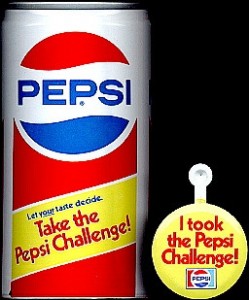 Do you remember the Pepsi Challenge? For those of you under the age of 25, it was a “blind taste test” that Pepsi did in stores, live. They placed a cup with Pepsi and a cup with Coke behind a screen and asked people to taste the two colas. It doesn’t matter whether you prefer Coke or Pepsi, the idea is that you have a choice. Lots of choices, actually (Coke, Pepsi, RC Cola, store brands, and even SodaStream). The idea behind the Pepsi Challenge was to allow people to experience an “A/B” test right in the store, right in front of a display of Pepsi products, so that if they took a sip and said, “yes, I like this one better” and it turned out to be Pepsi, maybe they’d buy some.
Do you remember the Pepsi Challenge? For those of you under the age of 25, it was a “blind taste test” that Pepsi did in stores, live. They placed a cup with Pepsi and a cup with Coke behind a screen and asked people to taste the two colas. It doesn’t matter whether you prefer Coke or Pepsi, the idea is that you have a choice. Lots of choices, actually (Coke, Pepsi, RC Cola, store brands, and even SodaStream). The idea behind the Pepsi Challenge was to allow people to experience an “A/B” test right in the store, right in front of a display of Pepsi products, so that if they took a sip and said, “yes, I like this one better” and it turned out to be Pepsi, maybe they’d buy some.
It was not meant to be scientific; it was marketing.
Marketing is about educating the person buying what you’re selling; to influence them into choosing your thing over every other thing like it. This is done by differentiating your thing from all the other things that are basically the same thing. Lots of companies make carbonated beverages. To differentiate their product from the rest, producers add (or remove) flavors, caffeine, extra carbonation, and so on; all in an effort to provide the consumer with a choice: do I buy the sweeter Pepsi or the more bitter Coke? By creating a sweeter drink, Pepsi gets customers that otherwise would purchase nothing.
Differentiating yourself, your company, and your product or service means finding the one thing (or many things) that makes you different – maybe not better, but definitely different. You can help a customer decide if it also makes it better, but you need to start with what’s different. Maybe all your parts are made in the US, maybe you employ underserved people in your manufacturing, or maybe you provide a lifetime warranty. These are all things that might differentiate your product from the other vendors, and you can use that to your advantage in your marketing.
You also need to be able to explain that difference, and why it’s beneficial, in one simple sentence. For instance: “we only employ parolees in our manufacturing, creating much-needed jobs and reducing recidivism in our community.” Bam! Instant differentiation. Plus, you may be able to leverage your differentiation into a emotional connections with consumers that identify with prison parolees, crime reduction, and so forth. Emotional connections are much stronger than simply being the best price, and can even lead to being able to charge premium prices because of those connections. Think of all the loyal Apple fans out there, for instance.
So remember: it’s not enough to have a great product or service. You have to differentiate it in the eyes of the consumer, and you have to be able to explain why those differences are important and bring value to what you’re selling. Good luck!
